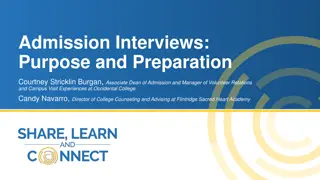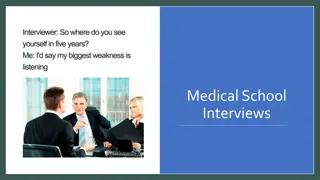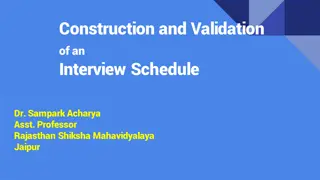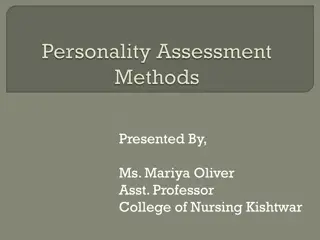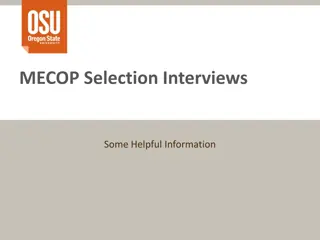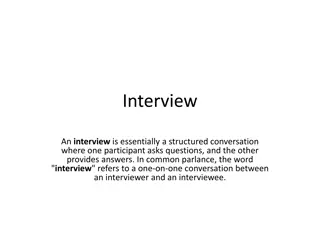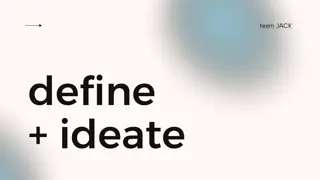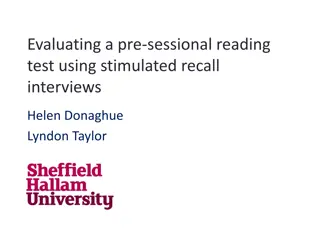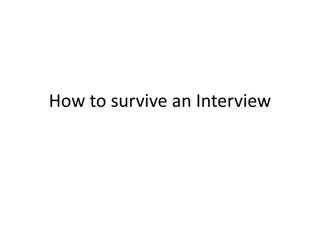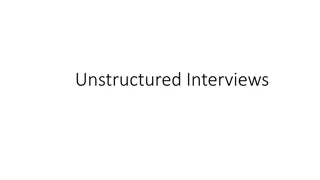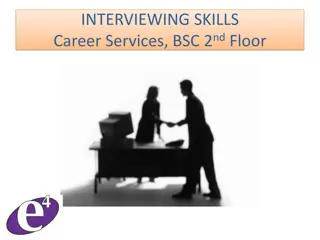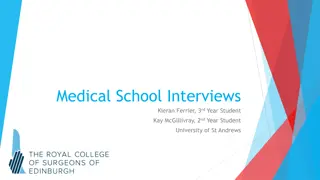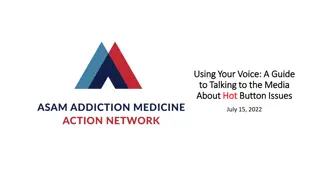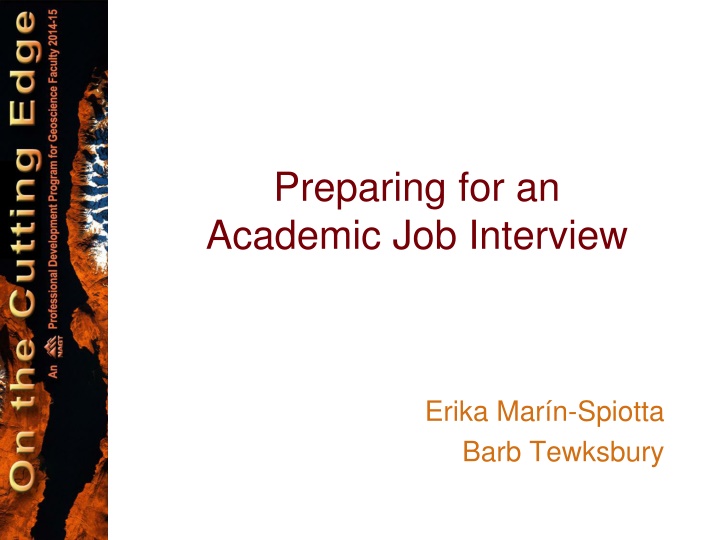
Mastering Academic Job Interviews: Tips and Strategies
Get ready for your academic job interviews with these comprehensive tips covering preparation, phone and Skype interviews, and handling interview questions. From researching the department to conducting practice sessions, this guide equips you for success. Utilize resources and advice to enhance your performance and confidence in landing your dream academic position.
Download Presentation

Please find below an Image/Link to download the presentation.
The content on the website is provided AS IS for your information and personal use only. It may not be sold, licensed, or shared on other websites without obtaining consent from the author. If you encounter any issues during the download, it is possible that the publisher has removed the file from their server.
You are allowed to download the files provided on this website for personal or commercial use, subject to the condition that they are used lawfully. All files are the property of their respective owners.
The content on the website is provided AS IS for your information and personal use only. It may not be sold, licensed, or shared on other websites without obtaining consent from the author.
E N D
Presentation Transcript
Preparing for an Academic Job Interview Erika Mar n-Spiotta Barb Tewksbury
Do your homework The Department strengths and mission What/who are they looking for? college/universi ty structure Interdisciplinary connections The faculty The courses Available and needed equipment The region and resources Support structure
Phone interviews Do a test ahead of time with a friend Have your friend be ruthless about annoying habits Borrow a head set if possible Be ready early on the day of your interview and dress as if you were going for a face to face interview Sit in place where you won t be distracted during the call
Skype interviews Choose the location carefully People can see everything behind you Be sure that you are front lit and not back lit; don t have a window behind you Don t sit too close to the camera the wide angle view can distort your face
Skype interviews Do a test ahead of time with a friend at the same time of day as your scheduled interview Both audio and lighting How close to sit to the camera How loud to talk Have your friend be ruthless about annoying habits
Skype interviews Avoid evening time when bandwidth issues are worst Dress as if you were going for a face to face interview Log on early on the day of your interview so that you are ready when they call and log out off all other social media or internet sites Have a set of ear buds handy in case of audio feedback
Interview questions http://graduate.dartmouth.edu/careers/ser vices/interview/acad.html Scroll down nearly to the bottom to the section on Questions to be prepared for Make a list of the ones that you feel you are least prepared to answer or you would find most challenging to answer For each, make a list of ideas for how you would address the question, including the information you would need to acquire.
How to deal with illegal questions Are you planning on having children? What does your husband or wife do? Oh, I see we went to the same alma mater. When did you graduate? Are you a U.S. citizen?
How to deal with illegal questions Be prepared: decide before the interview what questions you will answer (and how) and which ones you won t You can answer the legitimate concern behind the wrongful question without answering the question directly Resources: http://serc.carleton.edu/NAGTWorkshops/careerpr ep/jobsearch/interviewing.html#questions
In person interviews What to expect? Research university X (X) X Liberal arts college X (X) X Two-year college Research talk(s) Teaching demonstration Meet with search committee Meet with individual faculty Meet with administrator(s) Meet with students Meals/receptions/campus X X X X X X X X X X (X) X
In person interviews Research all the folks you are meeting with and know a bit about what they do. I had notes on their research in a notebook I could consult. My interviews started to improve when my attitude changed to "Why don't I look at this as an opportunity to learn about what they do." Once I did this, I started asking more questions, didn't worry about looking dumb, and had more fun with the process.
Practice your elevator talks Research - need at least three: 1. short, several sentences 2. longer: one paragraph 3. for the non-specialist Teaching - need several 1. courses you want to teach/can teach 2. teaching philosophy/strategy 3. mentoring philosophy (butbe careful about lecturing teachers about teaching!)
Practice your elevator talks Write down the gist of your elevator talks (not verbatim) and answers to common questions. Then practice, practice, practice verbalizing your answers. Saying them out loud is different than writing them down.
Questions at research institutions Tell me about your research. How may you recruit students? How do you envision your lab in 1 year, 5 years? What will your next proposal be on? What is your approach to mentoring students? What equipment will you need? How much start up do you need?
Questions at PUI How will you involve undergraduates in research? What is your approach to mentoring students? What equipment will you need? How will you advance your research if equipment is not available on campus? How will you integrate research and teaching? What courses would you like to teach?
Questions about teaching I made a list of the classes I had experience with and those that I hoped to teach in the future. I also made some very simple syllabi. I researched what classes were currently being offered and by whom, and offered what subjects I could teach, rather than specific course numbers, to avoid sounding like I would take over someone s favorite class
Preparing for questions from students Assume that students will have a say in who gets hired; treat them with respect and pay attention to them Students may ask very direct questions Ask what classes they would like to see offered Ask them about support and funding for students Ask them about collaboration opportunities Don t gossip, don t fish for dirt on the department or on the faculty
Responding to questions Practice giving specific answers with examples, general answers, and underlying theory answers Make it a conversation. Watch for glazed eyes (answers too long, not focused). Think of how to answer the question, and be able to follow with another question. Avoid jargon Look people in the eye, speak with a good volume
Responding to questions Watch your body language - practice power poses http://www.ted.com/talks/amy_cuddy_your_body_language_shap es_who_you_are Practice ways to say I don t know Rehearse questions with faculty, graduate students, and people outside your discipline. Don t worry about repeating yourself throughout the day- you ll be talking to different people Don t assume they ll have done your homework on you Keep up your enthusiasm/energy!
Caution! The interview is a conversation, not a negotiation - don t give fixed $$ amounts, buy yourself time but know ball park Be prepared for illegal questions (both intentional and accidental) Treat everybody you meet as if they were on the search committee (including students and staff) Mealtimes are also part of the interview, don t let your guard down!
Preparing a research talk Most likely will be a PowerPoint presentation Ask for expectations about time, etc. Use animations or other web links at your own risk Bring copies on a thumb drive Beware Mac to PC conversion failures Memorize your intro and conclusion- start and end strong Finish with future research directions
Preparing a teaching talk Who will be present? Is the demo in an actual class? What level is the class? Will the topic be provided to you? What constraints are imposed by the venue (PPT? Doc Camera?) Ask questions about the format and setting Do what is asked Target the audience Provide context Use effective teaching strategies Practice Be enthusiastic! Prepare to teach
Preparing a teaching talk Practice, practice, practice. Make sure you are within time limit. Big, easily readable slides from far away. Clear photos. Give the talk of your life - energetic, enthusiastic, and try to make it a bit interactive. Make sure to ask at what level to give the interview talk.
Be prepared: logistics Dress well but comfortably - avoid new shoes, and plan your outfits beforehand Check the weather before you travel Take snacks and a water bottle as meals may be far between and you may not have time to eat much during the lunches, especially Pack a toothbrush for interview meals and check yourself in the mirror!
This is your chance to interview them, too Know what to ask faculty, search committee, chair, deans, students, staff Don t be afraid of repeating yourself They want to see if you will be a good colleague as much as you want to know if you ll like working there When in doubt ask people about their research or teaching Ask about resources and support for young faculty, tenure process, etc.
Other resources On the Cutting Edge: Academic Job Interviews http://serc.carleton.edu/NAGTWorkshops/careerprep/jobsearch/intervie wing.html On the Cutting Edge: Typical Questions http://serc.carleton.edu/NAGTWorkshops/careerprep/jobsearch/intervie wquestions.html Questions to ask (and be prepared to answer) http://graduate.dartmouth.edu/careers/services/interview/acad.html Tomorrow s Professor: Interview preparation guide http://cgi.stanford.edu/~dept-ctl/cgi-bin/tomprof/posting.php?ID=94 The Academic Job Search Handbook, by M. Heiberger and J. Vick, 2001: ISBN 0812217780



